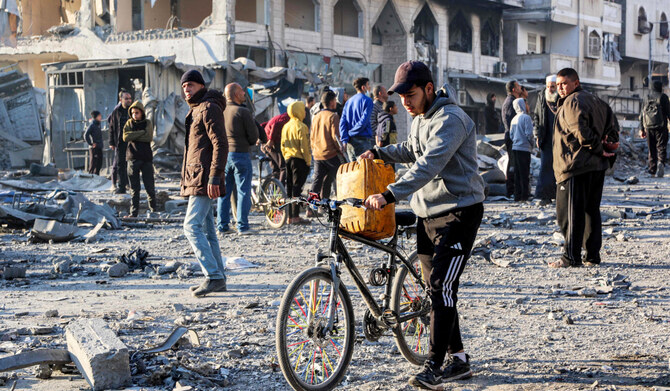CAIRO: Good progress is being made in rolling out a polio vaccine to children in Gaza but a permanent ceasefire in the 11-month war is needed to ease humanitarian suffering, the main UN agency for Palestinians said on Wednesday.
UNRWA said that three days into the campaign in areas of central Gaza, around 187,000 children had received the vaccine. The campaign will move to other areas of the Palestinian enclave for the second stage.
The campaign was prompted by the discovery of a case of polio in a baby boy last month, the first in the Gaza Strip for 25 years. Israel and Hamas militants agreed to daily pauses of eight hours in the fighting in pre-specified areas to allow the vaccination program. No violations have been reported.
“Great progress! Every day in the Middle Areas of #Gaza, more children are getting vaccines against #Polio,” the head of UNRWA, Philippe Lazzarini, said on X on Wednesday.
“While these polio ‘pauses’ are giving people some respite, what is urgently needed is a permanent ceasefire, the release of all hostages + the standard flow of humanitarian supplies including medical and hygiene supplies (into Gaza),” he said.
Palestinians say a big reason for the return of polio is the collapse of Gaza’s health system and the destruction of most of its hospitals during the war. Israel accuses Hamas of using hospitals for military purposes, something the Islamist group denies.
On Tuesday, COGAT, an Israeli defense ministry agency tasked with coordinating aid deliveries into Palestinian territories, said since the onset of the war, it has facilitated the entry of 282,126 vials of the polio vaccine, enough for 2,821,260 people.
It also said in a statement that approximately 554,512 vials of vaccines have entered the Gaza Strip, enough for 4,973,736 individual vaccines for various diseases and potential epidemics in the territory.
Gaza has around 2.3 million people and is one of the world’s most densely populated places.
Diplomatic standstill
Despite the success of the polio campaign, diplomatic efforts to secure a permanent ceasefire, release hostages held in Gaza and return many Palestinians jailed by Israel, have faltered.
Israeli Prime Minister Benjamin Netanyahu insisted on Monday that Israeli troops would remain in the Philadelphi corridor on the southern edge of Gaza bordering Egypt, one of the main sticking points in reaching a deal.
Hamas, which wants any agreement ending the war to include a withdrawal of all Israeli forces from Gaza, says such a condition, among some others, would prevent an accord. Netanyahu says the war can only end when Hamas is eradicated.
The impasse is frustrating Israel’s international allies and the 15 members of the United Nations Security Council.
Slovenia’s UN envoy — the council’s president for September — said on Tuesday that patience is running out and the global body will probably consider taking action if a ceasefire cannot be brokered soon.
Senior Hamas official Sami Abu Zuhri told Reuters that the only way a deal could be reached was if Israel agreed to a US proposal on July 2, endorsed by the Security Council, and accepted by the group. Both Israel and Hamas blame failure to clinch a deal on conditions added by each of the two sides.
Israeli forces continued to battle Hamas-led militants in several areas of Gaza, saying they had killed many senior Hamas operatives and struck military infrastructure and command centers over the past 24 hours.
Later on Wednesday, the Israeli military said Israeli troops operating in Rafah, near the Egyptian border, had killed around 200 Palestinian gunmen over the past week and located dozens of weapons in civilian buildings. Hamas denies exploiting civilian facilities and population for military purposes.
The armed wing of Hamas and the Islamic Jihad said their fighters had again confronted Israeli troops in the north and south of the territory with anti-tank rockets, mortar fire and explosive devices.
In Khan Younis, an Israeli airstrike killed two Palestinians, including a girl, medics said, while an airstrike in the Darraj suburb of Gaza City killed a local doctor, Nehad Al-Madhoun, in his house.
In the northern Gaza town of Beit Lahiya, medics said an Israeli airstrike killed six Palestinians awaiting aid trucks near the Sheikh Zayed housing project.
The war in Gaza was triggered by Hamas’ Oct. 7 rampage into southern Israel, when its fighters killed 1,200 people and captured more than 250 hostages, according to Israeli tallies.
Since then, more than 40,800 Palestinians have been killed in Gaza, according to the enclave’s health ministry.




























